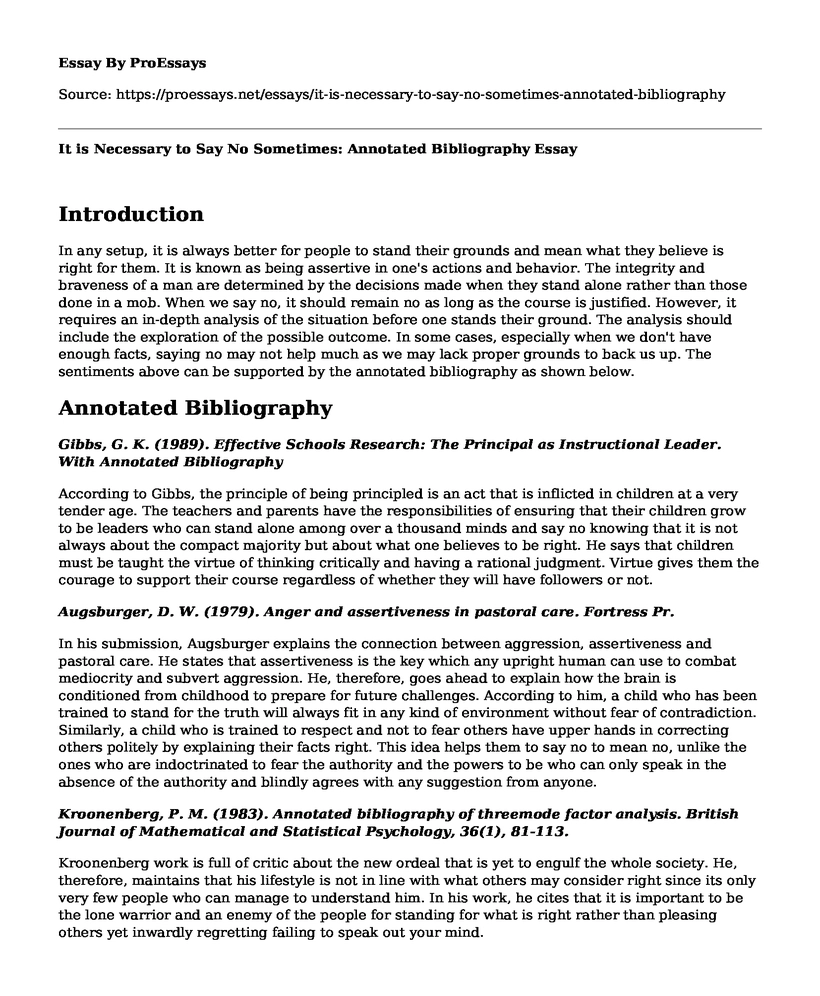Introduction
In any setup, it is always better for people to stand their grounds and mean what they believe is right for them. It is known as being assertive in one's actions and behavior. The integrity and braveness of a man are determined by the decisions made when they stand alone rather than those done in a mob. When we say no, it should remain no as long as the course is justified. However, it requires an in-depth analysis of the situation before one stands their ground. The analysis should include the exploration of the possible outcome. In some cases, especially when we don't have enough facts, saying no may not help much as we may lack proper grounds to back us up. The sentiments above can be supported by the annotated bibliography as shown below.
Annotated Bibliography
Gibbs, G. K. (1989). Effective Schools Research: The Principal as Instructional Leader. With Annotated Bibliography
According to Gibbs, the principle of being principled is an act that is inflicted in children at a very tender age. The teachers and parents have the responsibilities of ensuring that their children grow to be leaders who can stand alone among over a thousand minds and say no knowing that it is not always about the compact majority but about what one believes to be right. He says that children must be taught the virtue of thinking critically and having a rational judgment. Virtue gives them the courage to support their course regardless of whether they will have followers or not.
Augsburger, D. W. (1979). Anger and assertiveness in pastoral care. Fortress Pr.
In his submission, Augsburger explains the connection between aggression, assertiveness and pastoral care. He states that assertiveness is the key which any upright human can use to combat mediocrity and subvert aggression. He, therefore, goes ahead to explain how the brain is conditioned from childhood to prepare for future challenges. According to him, a child who has been trained to stand for the truth will always fit in any kind of environment without fear of contradiction. Similarly, a child who is trained to respect and not to fear others have upper hands in correcting others politely by explaining their facts right. This idea helps them to say no to mean no, unlike the ones who are indoctrinated to fear the authority and the powers to be who can only speak in the absence of the authority and blindly agrees with any suggestion from anyone.
Kroonenberg, P. M. (1983). Annotated bibliography of threemode factor analysis. British Journal of Mathematical and Statistical Psychology, 36(1), 81-113.
Kroonenberg work is full of critic about the new ordeal that is yet to engulf the whole society. He, therefore, maintains that his lifestyle is not in line with what others may consider right since its only very few people who can manage to understand him. In his work, he cites that it is important to be the lone warrior and an enemy of the people for standing for what is right rather than pleasing others yet inwardly regretting failing to speak out your mind.
Conclusion
Generally, it is always very important to be assertive even if it means remaining without friends.
Reference
Augsburger, D. W. (1979). Anger and assertiveness in pastoral care. Fortress Pr.
Gibbs, G. K. (1989). Effective Schools Research: The Principal as Instructional Leader. With Annotated Bibliography.
Kroonenberg, P. M. (1983). Annotated bibliography of threemode factor analysis. British Journal of Mathematical and Statistical Psychology, 36(1), 81-113.
Cite this page
It is Necessary to Say No Sometimes: Annotated Bibliography. (2022, Nov 22). Retrieved from https://proessays.net/essays/it-is-necessary-to-say-no-sometimes-annotated-bibliography
If you are the original author of this essay and no longer wish to have it published on the ProEssays website, please click below to request its removal:
- The Process of Nurturing the Infants: Creating Space for the Baby Essay
- Are Parents to Blame for Childhood Obesity Essay Example
- Women's Indian Captivity Narratives - Essay Sample
- Essay Example on Famous Figures of Modernity: Charles Darwin
- Essay Sample on Inequality in America: The Rich vs. Poor Divide
- Gender & Sexuality - Annotated Bibliography
- Research Paper Sample on PTSD: A Growing Challenge for U.S. Military Personnel







